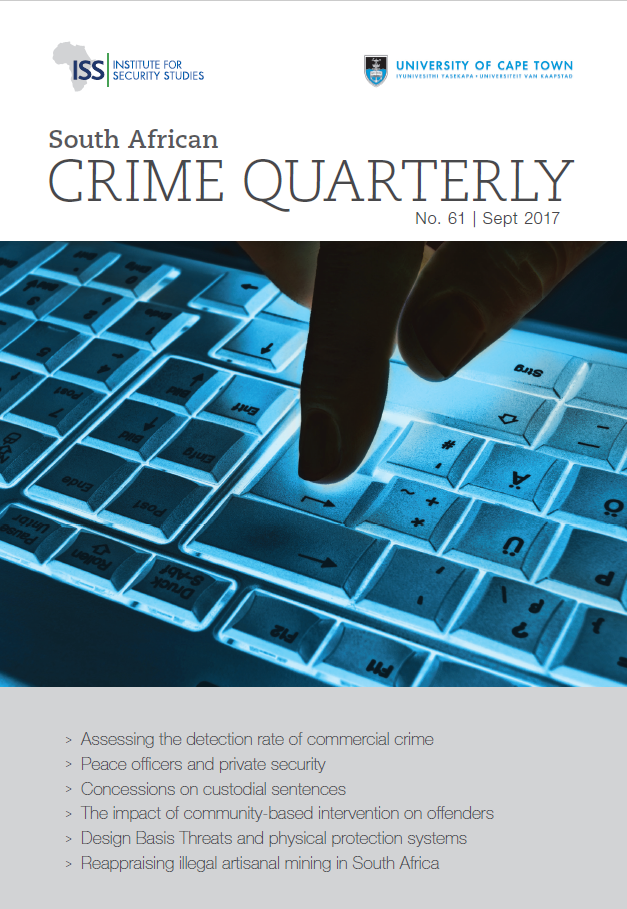Exploring questions of power: Peace officers and private security
DOI:
https://doi.org/10.17159/2413-3108/2017/i61a2006Keywords:
crime, crime prevention, legal powers, police, private securityAbstract
There is a need for different stakeholders to work together to help the police combat crime in Gauteng, South Africa. Private security officers are usually well positioned to help combat crime because they can witness crime in areas where they are posted or are patrolling as response officers. Private security officers protect organisations (public and private) or individuals who are their paying clients. But they can only perform their duty as ordinary citizens, not as the police would. In looking at how these officers can be more effective, this article establishes to what extent private security officers need additional legal powers, and what powers would be suitable for them in helping the police combat crime.
Mixed methods were used in this study of 20 police stations and 20 private security companies in Gauteng. From top management levels in the South African Police Service (SAPS), 37 high-ranking police officers participated in the study and 30 high-ranking security officers from top management level of the private security industry (PSI). At the operational levels, 173 SAPS officers completed the questionnaires and 163 PSI officers.
The findings show that the majority of respondents see no need for private security officers to be given additional powers to help the police combat crime. However, the few respondents who supported the idea think that the power to arrest, and stop and search the public, should be given to private security personnel. At the operational level, all respondents agreed that private security officers should be given additional legal powers to help the police combat crime.
:
Downloads
References
M Schonteich, Outsourcing: Risks and benefits. Private Muscle. ISS Monograph No. 93. ISS: Pretoria, 2004.
J Berg, Holding South Africa’s private security industry accountable: Mechanisms of control and challenges to oversight. Acta Criminologica. 21 (1), pp. 87–96, 2008.
J Berg, The Accountability of South Africa’s Private Security Industry: Mechanisms of Control and Challenges to Effective Oversight. Newlands: Criminal Justice Initiative, 2007.
K Strom, M Berzofsky, B Shook-Sa, K Barrick, C Daye, N Horstmann and S Kinsey, The Private Security Industry: A Review of the Definitions, Available Data Sources, and Paths Moving Forward. Final Report funded by U.S. Department of Justice and made electronically available by NCJRS, 2010.
C Vidulich, Security and Protection Handbook. Randburg: Thomson Publications, 1982.
A Minnaar, Private–public partnerships: Private security, crime prevention and policing in South Africa. Acta Criminologica. 18 (1), pp. 85–114, 2005.
J Burger and G Newham, Sinister motive in law on guards: Are foreign-owned security companies really a threat to SA? Pretoria News. 23 April: 10, 2014.
M Schonteich, Unshackling the crime fighters: Increasing private sector involvement in South Africa’s criminal justice system. Johannesburg: South African Institute of Race Relations, 1999.
Ibid.
A Minnaar, Oversight and monitoring of non-state/private policing: The private security practitioners in South Africa. Private Security in Africa: Manifestation, challenges and regulation. ISS Monograph Series No. 139, pp 127–150, 2007.
Ibid.
J Kole, How effectively is the Private Security Industry Regulatory Authority (PSIRA) regulating the security industry in South Africa? Acta Criminologica, Crimsa Conference: Special Edition 2, pp. 154–168, 2010.
S Gumedze, Regulating the private security sector in South Africa. Social Justice. 3/4, Securing the Imperium: Criminal Justice, Privatisation & Neoliberal Globalization, pp. 195–207, 2007.
BL Berg, Qualitative Research Methods for the Social Sciences. 5th edition. Boston: Pearson, 2004.
DL Morgan, Integrated Qualitative & Quantitative Methods: A Pragmatic Approach. Los Angeles: Sage.
Ibid.
LT Choy. The strengths and weaknesses of research methodology: Comparison and complimentary between qualitative and quantitative approaches. IOSR Journal of Humanities and Social Science (IIOSR-JHSS), 19 (4): 99–104, 2014.
P Davies, P Francis and V Jupp, Doing Criminological Research. 2nd edition. London: Sage, 2011.
MG Maxfield and ER Babbie, Basics of Research Methods for Criminal Justice and Criminology. 3rd edition. Australia: Wadsworth Cengage, 2012.
M Herbert, Planning a Research Project: A Guide for Practitioners and Trainees in the Helping Professions. London: Cassell, 1990.
E Henning, Finding your Way in Qualitative Research. Pretoria: Van Schaik, 2004.
NJ Salkind, Exploring Research. 8th edition. University of Kansas: Pearson, 2012.
PD Leedy and JE Ormrod, Practical Research: Planning and Design. 10th edition. Boston: Pearson, 2010.
D George and P Mallery, SPSS for Windows Step by Step: A Simple Guide and Reference 11.0 Update. 4th edition. Boston: Pearson, 2003.
JF Hair Jr, WC Black, BJ Babin and RE Anderson, Multivariate Data Analysis: A Global Perspective. 7th edition. Upper Saddle River, N.J.: Pearson, 2010.
Downloads
Published
Issue
Section
License
Copyright (c) 2017 Author and Institute for Security Studies

This work is licensed under a Creative Commons Attribution 4.0 International License.
SACQ is licenced under a creative commons licence (CC BY) that allows others to distribute, remix, tweak, and build upon your work, even commercially, as long a they give appropriate credit, provide a link to the license, and indicate if changes were made. They may do so in any reasonable manner, but not in any way that suggests the licensor endorses you or your use.
Copyright for articles published is vested equally between the author/s, the Institute for Security Studies and the Centre of Criminology (UCT).




.png)